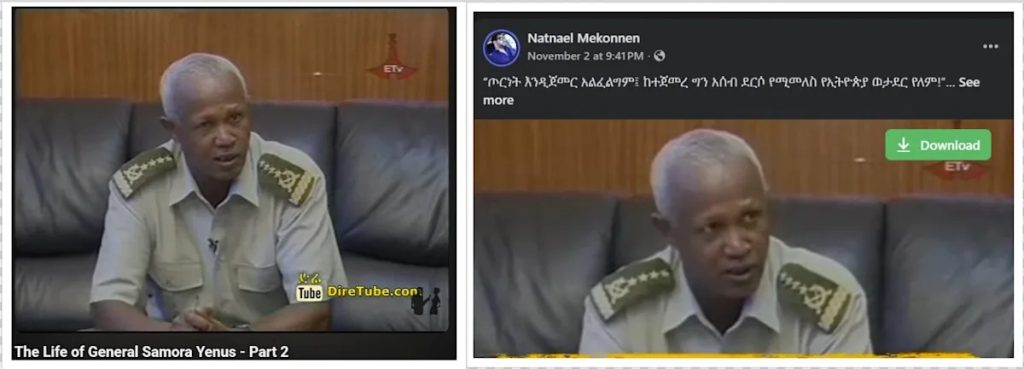Listen to the article
False Claims About Former Ethiopian General on Eritrea Port Circulate Amid Rising Tensions
A manipulated video falsely claiming that former Ethiopian army general Samora Yunus advocated for the occupation of Eritrea’s Assab port has been circulating on social media, fueling concerns amid escalating military tensions between the two Horn of Africa neighbors.
The misleading Facebook post from November 2, 2025, features footage of Samora with a fabricated voiceover claiming he stated: “I do not want the war to begin. If the war starts, the Ethiopian army’s operation will not be limited to occupying Assab.” The post attributes these aggressive statements to Samora, who served as Ethiopia’s army chief from 2001 to 2018.
Fact-checking efforts have revealed the video uses footage from a 2012 interview of Samora, with his original voice removed and replaced by a narrator who makes inflammatory claims about Ethiopia’s intentions toward the strategically important Red Sea port city.
The manipulated footage circulated widely among Ethiopian government supporters at a time of heightened regional tension. The narrator falsely suggests Samora supported Prime Minister Abiy Ahmed’s recent parliamentary address about Ethiopia’s “irreversible” quest for Red Sea access, delivered on October 28, 2025.
“The Assab port issue has never been forgotten by the Ethiopian people. I have been waiting for a long time. The time has now arrived,” says the fabricated voiceover, incorrectly attributed to the former general.
The doctored video further falsifies Samora’s position by claiming he said the Eritrean government, referred to as “Shabia,” rejects peaceful conflict resolution and instead “uses terrorism as a solution and war as a legal way of achieving their interests.”
Relations between Ethiopia and Eritrea have followed a tumultuous path since Eritrea gained independence in 1993. The neighbors engaged in a devastating border war from 1998 to 2000 that claimed tens of thousands of lives and left deep scars on both nations.
After a period of rapprochement that began in 2018 with Prime Minister Abiy’s peace initiatives – which earned him the 2019 Nobel Peace Prize – relations have again deteriorated sharply. Recent weeks have seen the Ethiopian government accuse Eritrea of preparing for war, allegations Eritrea has dismissed as “provocative saber-rattling.”
Regional analysts have expressed growing concern that these escalating tensions could trigger another destructive conflict in the already volatile Horn of Africa region, which continues to grapple with numerous humanitarian and security challenges.
A reverse image search conducted by fact-checkers confirmed that the footage comes from a 26-minute interview with Samora published on YouTube in 2012. In the original interview, the former general discusses his experiences as both a guerrilla leader with the Tigray People’s Liberation Front (TPLF) and as army chief, but makes no mention of Eritrea or the Assab port.
The video manipulation technique of removing original audio and replacing it with fabricated statements represents a particularly dangerous form of misinformation that can inflame tensions in conflict-prone regions.
Samora, who retired from military service in 2018, has not made any public statements resembling those falsely attributed to him in the manipulated video. His last known recorded interview was in 2020, where he appeared noticeably older than in the repurposed 2012 footage currently circulating online.
This incident highlights the growing challenge of digital misinformation in conflict zones, where manipulated media can be weaponized to advance political narratives and potentially contribute to real-world escalations in already tense situations.
Fact Checker
Verify the accuracy of this article using The Disinformation Commission analysis and real-time sources.




7 Comments
This is a troubling development, with the spreading of false claims about military intentions. It’s important to maintain a clear and factual understanding of the situation, rather than allowing inflammatory rhetoric to cloud the issues. What do you think can be done to prevent the further escalation of this kind of disinformation?
It’s troubling to see this kind of disinformation being spread, especially in a region with existing tensions. Manipulating video and audio to falsely attribute aggressive statements is a concerning tactic that can quickly spiral out of control. I wonder what the motivations are behind this kind of campaign and how it can be effectively countered.
This is a concerning case of misinformation, manipulating video footage to spread false claims about military intentions. It’s important to fact-check such claims and not let them escalate regional tensions. What do you make of the motivations behind this kind of disinformation campaign?
Ah, another case of manipulated media being used to inflame regional conflicts. It’s worrying to see this kind of tactic employed, as it can quickly spiral out of control. I hope the relevant authorities are closely monitoring the situation and taking appropriate action to address this misinformation.
This is a prime example of the dangers of misinformation in the digital age. Fabricating audio and video to misrepresent a military leader’s statements is a serious breach of trust and can have dire consequences. I hope the relevant authorities are working to swiftly address this issue and prevent further escalation.
The use of fabricated audio to misrepresent a former military leader’s statements is a serious issue. Spreading these kinds of false claims can have real-world consequences, especially in regions with ongoing geopolitical tensions. I wonder what steps are being taken to counter this kind of disinformation.
The use of manipulated video footage to make such inflammatory claims is deeply concerning. It’s crucial that we remain vigilant and fact-check information, especially when it comes to sensitive geopolitical matters. I wonder what the long-term implications of this kind of disinformation campaign could be.